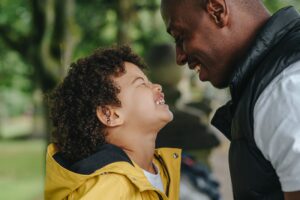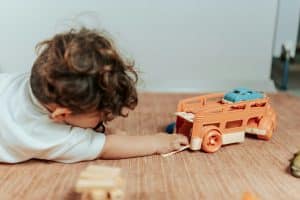Playing with your children is crucial to their social-emotional development, boosts their self-esteem, and helps develop executive function skills like problem-solving and critical thinking.
When you play with your child, you help them build a secure attachment to important adults. Secure attachment is needed to develop self-esteem and independence. Children need a secure attachment to take healthy risks, like climbing the jungle gym, trying out for the school play, or going to school for the first time.

Here’s a look at how different ways of playing with your child positively affect your child’s social, emotional, and cognitive growth.
Games
Games like Simon Says help children learn to follow the rules, maintain self-control, take turns, and think strategically.
Board games teach counting, patterns, and colors. And just like Simon Says and other playground games, they learn how to handle loss, follow the rules, and wait patiently for their turn.

Gameplay through apps and online games can also develop these skills and help toddlers and preschoolers understand concepts like cause and effect. Our Wake Up Sammy is the perfect example of learning cause and effect through online gameplay!
Plus, studies show that gaming together as a family and making electronic time interactive is beneficial!
Pretend Play
Encourage pretend play by providing your child with various props and dress-up items. Pretend play gives children an opportunity to experiment with various social roles and mimic real-life experiences.
When young children engage in make-believe play, they learn persistence, task mastery, and social skills and develop language skills and empathy.
Dance Party
Music encourages non-verbal reasoning and sharpens the perception of language. Dance strengthens bones and joints and is just plain good exercise. So turn on the radio and get your groove on.

STEAM
Building a colossal tower of LEGOS and sending it crashing to the floor in one movement, sending blocks flying across the room, is learning! They’re learning cause and effect, physics, and developing scientific inquiry.
Block play and construction activities let kids sort and classify objects based on shape and engage in estimation and measurement. They interact creatively with materials and develop problem-solving skills.
Encourage your child to play with open-ended creative materials like blocks, LEGOS, magnet tiles, art supplies, Play-Doh, K-Nex, etc.
Story Telling
Telling stories with your child and asking them “what happens next” is not only an excellent way to develop their imagination, it introduces concepts of emotion and strengthens parent-child communication.

Reading books and creating or acting out stories benefit your child’s literacy and language development. And don’t be afraid of books with big words either; hearing new language used is how they (and we ) learn!
You’ll notice that KneeBouncer games and apps have storylines that are open to imaginative interpretation. So get interactive with your child as they play, and ask them questions!
These and so many other wonderful ideas are ways to enjoy playing with your children while building crucial social-emotional and cognitive skills! Not sure what to play? Then take your child’s lead and follow their interests.
Updated May 19, 2023, by L. Elizabeth Forry








